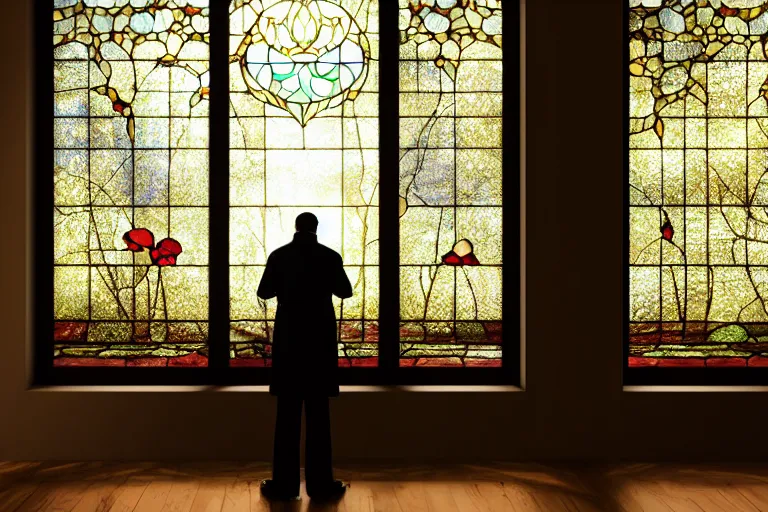Exploring the complexities of divine justice, free will, and eternal destiny.
This article delves into the intricate relationship between a loving God and the concept of hell. We’ll explore various perspectives, biblical interpretations, and philosophical debates to provide a well-rounded understanding of this deeply controversial topic.
The Biblical Perspective on Hell
Imagine walking through the pages of ancient texts, searching for answers about God’s love and hell. How can a divine being, often described as all-loving and merciful, be associated with such a concept as eternal punishment? The biblical perspective on hell is a complex one that intertwines with the notions of free will and divine justice.
The book of Revelation describes hell as a place of torment where the wicked are cast, a place of fire and brimstone. But why would God create such a place? Is it merely to satisfy some cosmic need for balance or retribution? Or could there be a deeper purpose?
Consider the metaphor of a parent setting boundaries for their child. Just as a loving parent sets limits to protect and guide, might God establish rules for the same reasons—to ensure His creation experiences true freedom and happiness? Could hell serve as a deterrent that actually enhances the joy and freedom in heaven?
Biblical scholars often discuss the concept of free will. If God offers salvation to all, why would anyone choose damnation? This raises questions about personal responsibility and moral choice. How does the idea of free will fit into the picture of a loving God who desires every soul’s redemption?
The book of Proverbs 1:26-31 describes those who reject wisdom as becoming like birds that soar to their own destruction. This metaphor suggests that one’s choices lead them inexorably towards their chosen path. In this light, hell could be seen not as a place of eternal punishment but rather the ultimate consequence of one’s choice.
In exploring these complexities, we are led to ponder our own decisions and the weight they carry. Are we truly free to choose, or is there more to the divine plan than we can comprehend? The biblical perspective on hell invites us to reflect deeply on our paths in life and the choices that shape our destinies.
The Philosophical Debate: A Loving God and Hell
Have you ever wondered how a Loving God could send someone to hell? The idea can be perplexing and even contradictory. How does divine justice fit into this picture, especially when considering that we have free will to make choices in our lives?
The philosophical debate over the concept of a loving God sending people to hell is complex and multi-faceted. Some argue that an omnipotent and omnibenevolent deity must be just, meaning that eternal punishment for sin is necessary to maintain cosmic order. But how can this be reconciled with a loving nature attributed to God in many religious traditions?
On the other hand, critics often point out the potential moral and ethical dilemmas associated with divine retribution. If God’s love is truly unconditional, does sending someone to hell make sense? This raises questions about the nature of God’s character—could it be that Loving God allows for free will even if this means some may choose paths that lead away from Him?
Theologians and philosophers have grappled with these issues, often using metaphors to explain divine justice. For instance, some liken the concept of hell to a form of purgatory or spiritual correction. This suggests that punishment is not eternal but serves as a means for souls to grow and be transformed. In this view, hell becomes a place where individuals are given more time to understand their mistakes and seek redemption.
Others argue that Loving God may have other reasons for allowing or even creating different destinies, which we cannot fully comprehend from our limited human perspective. This could mean that there is no actual punishment but rather a natural consequence of one’s choices—much like how the law of gravity operates without any malice.
The discussion around this concept often revolves around the balance between justice and mercy. Can both coexist? Or must one be prioritized over the other in understanding Loving God? These questions invite us to reflect on our own beliefs and values, challenging us to consider the broader implications of divine justice.
Free Will and Eternal Destiny
Free will and eternal destiny—the dance between choice and predestination. How can a loving God, who desires us to freely choose Him, also ensure that every soul finds its eternal home? Isn’t it like trying to decide if the sun is both warm and cool at once?
The idea of free will introduces a complex paradox: how does one have freedom when everything is predetermined? Imagine navigating through a maze where every turn you make was laid out from the start. Would your choices feel real, or would they just be following a preordained path?
- Is it not ironic that we value our choices so highly, yet we wonder if these very same choices are predestined?
The concept of eternal destiny adds another layer to this intricate tapestry. If God knows our future, does that mean our free will is merely an illusion? Or could it be that even knowing the outcome, He still gives us the freedom to choose Him or reject Him, just as a sculptor can foresee the final sculpture but still allows each piece of marble its unique journey?
Consider this: If God created us with the capacity for free will, doesn’t that imply trust in our choices? It’s like giving a child wings and saying, ‘You choose how high you fly.’ Yet, if the goal is to ensure every soul finds peace and joy, wouldn’t it be more comforting if every path led to that same destination?
How do we reconcile these seemingly contradictory aspects of divine justice and free will? Are we destined to make mistakes or can our choices truly change our eternal destiny? These questions linger like shadows at the edge of a beautiful sunset—both mysterious and awe-inspiring.
In this journey through faith, one thing remains clear: the concept of a loving God and His relationship with eternal destiny is not about finding simple answers but embracing the complexity of belief. Just as a symphony has many instruments playing in harmony, our understanding of free will and destiny must include both divine sovereignty and human choice.
The Concept of Hell in Different Religions
When we delve into the concept of hell, it’s like exploring a vast and complex labyrinth, with each religion mapping out its own unique path through the corridors of belief. In Christianity, for example, hell is often depicted as a place of eternal punishment, where sinners are tormented by flames in an afterlife. But how does this vision compare to that found in other faiths?
In Islam, hell (Jahannam) is similarly portrayed as a fiery place, but it also emphasizes the importance of free will. Muslims believe that they will face judgment for their actions on Earth and that true believers will be rewarded with paradise. The idea here is that the path to heaven or hell is determined by one’s deeds in life—much like walking through a maze where your choices can lead you either left or right, towards light or darkness.
Contrast this with Hinduism, which does not traditionally emphasize an afterlife of eternal suffering. Instead, it focuses on the concept of karma and reincarnation. According to this belief, individuals are reborn based on their past actions. This cycle can continue indefinitely until they achieve spiritual enlightenment (moksha). In this view, hell is more about temporary purgatory rather than an eternal torment.
So, when we ask ourselves why different religions have such varied views on hell, it often comes down to their unique interpretations of divine justice. Why does a loving God permit suffering? Is hell a place where souls are punished for eternity, or is it more about purification and transformation?
The answer, perhaps, lies in the heart of each believer. For some, the fear of eternal punishment serves as motivation to live virtuously. For others, the belief in reincarnation provides a chance at redemption through multiple lifetimes. And still, for those who hold to Christian or Islamic teachings, the prospect of forgiveness and redemption remains open, offering hope even in the face of divine judgment.
As we navigate these complex beliefs, it’s clear that the concept of hell is as multifaceted as the human spirit itself. Each religion offers a lens through which to view our own morality and spirituality, inviting us to ponder not just where souls might go after death, but how they can find their way back to love.
The Role of Forgiveness and Redemption
How can we reconcile the idea of a loving God who desires our happiness with the concept of hell, where suffering and pain seem to be eternal? Is there any chance for forgiveness and redemption in this vast tapestry of belief?
Imagine a garden where every flower represents a soul. Each one is unique, yet all thrive under the nurturing care of the gardener—God. But what if a few wayward flowers wander too far from home, neglecting their roots? Do we believe that such neglect should lead to eternal withering, or could there be a chance for those flowers to return to the light?
Forgiveness in this context becomes not just a personal act of grace but an opportunity for transformation. Could it be that God’s love is so profound and unconditional that even the farthest wandering soul can find its way back? And what about those who have wandered for so long, their paths clouded by sin and misunderstanding? Could redemption still be within reach?
The journey to forgiveness and redemption often involves acknowledging mistakes, seeking help, and making amends. It’s like retracing the steps one took away from home, but with a map of guidance provided by divine wisdom. This path is not easy; it requires courage and humility, much like climbing out of a deep pit after falling into it.
Is there hope for those who have made mistakes? Can they return to the garden, or are some lost forever in the depths of their own making? The idea that forgiveness and redemption are possible offers a glimmer of hope, suggesting that no matter how far we may stray, there is always a way back.
In this quest for understanding, we must also consider the role of free will. If God created us with choice, then the burden to make wise decisions lies on our shoulders. But when we falter, can’t we turn to a higher power that understands and forgives? The concept of hell might serve as a wake-up call, a reminder of the consequences of our actions without being an unbreakable prison.
So, in exploring these complex ideas, let us approach them with openness and curiosity. For in this journey of understanding, we may find not only answers but also a deeper appreciation for the love that guides us, even when it seems farthest from our hearts.
Engaging in Dialogue: A Loving God, Hell, and You
Engaging in dialogue about a loving God and hell can often feel like walking through a dense forest, where every path seems to lead to new questions and reflections. How do we navigate this terrain without getting lost? First, it’s important to approach these discussions with an open mind, recognizing that different beliefs offer various maps of the spiritual landscape.
Start by asking your friends or family members about their personal views on God. What does love mean to them in this context? Are they familiar with the idea of a loving God? Often, people have strong opinions shaped by their experiences and culture. Share yours too, but keep an ear open for their perspectives.
‘How do you see forgiveness fitting into your understanding of a loving God?’ This question can help bridge the gap between different beliefs about divine justice. Many find it challenging to reconcile a God who is both just and merciful, especially when considering the concept of hell as a place of eternal separation from God.
A helpful tool in these discussions is using metaphors that resonate with your audience. For instance, you could compare our relationship with God to a parent-child bond, where discipline might be seen not just as punishment but as an act of care and concern for the child’s long-term well-being.
Another approach is to explore practical examples that bring these abstract concepts down to earth. For example, discuss how the concept of ‘free will’ plays out in everyday life, reflecting on choices we make every day that can have both positive and negative consequences.
Involving stories from various religious traditions can also enrich your discussion. Tales of forgiveness, redemption, and the afterlife offer diverse insights into what these concepts might mean. Encourage everyone to share their own personal experiences or anecdotes related to these topics, as they can provide powerful points for reflection.
Lastly, keep the conversation respectful and focused on understanding rather than winning an argument. Remember that every belief is a journey, and no one starts with all the answers. By fostering an environment of mutual respect and curiosity, you might find that your discussions become more enriching and less confrontational.
Conclusion
 By the end of this article, you will have gained valuable insights into the complexities surrounding the idea of a loving God and hell. You’ll understand different viewpoints and be equipped with knowledge to engage in thoughtful discussions on this subject.
By the end of this article, you will have gained valuable insights into the complexities surrounding the idea of a loving God and hell. You’ll understand different viewpoints and be equipped with knowledge to engage in thoughtful discussions on this subject.











